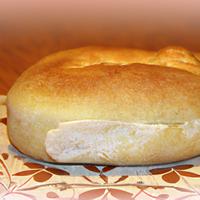
1 serving (43 grams) contains 120 calories, 4.0 grams of protein, 2.0 grams of fat, and 22.0 grams of carbohydrates.

Log this food in SnapCalorie

Nutrition Information
Calories |
659.3 | ||
|---|---|---|---|
% Daily Value* |
|||
| Total Fat | 11.0 g | 14% | |
| Saturated Fat | 2.7 g | 13% | |
| Polyunsaturated Fat | 0 g | ||
| Cholesterol | 0 mg | 0% | |
| Sodium | 1153.8 mg | 50% | |
| Total Carbohydrates | 120.9 g | 43% | |
| Dietary Fiber | 5.5 g | 19% | |
| Sugars | 11.0 g | ||
| protein | 22.0 g | 44% | |
| Vitamin D | 0 mcg | 0% | |
| Calcium | 219.8 mg | 16% | |
| Iron | 6.6 mg | 36% | |
| Potassium | 219.8 mg | 4% | |
* Percent Daily Values are based on a 2,000 calorie diet. Your daily values may be higher or lower depending on your calorie needs.
Food Attributes
Source of Calories
About Soft white bread roll
Soft white bread rolls are a staple in various cuisines worldwide, commonly associated with American and European baked goods. Made from simple ingredients like wheat flour, water, yeast, sugar, salt, and sometimes enriched with milk or butter, these rolls have a light, fluffy texture and a mild flavor ideal for pairing with both sweet and savory fillings. While soft white bread rolls provide quick energy through carbohydrates, they are often low in fiber and essential nutrients, especially when made with refined flour. Many commercial versions may contain added sugar or preservatives. While not the healthiest option on their own, they can be part of a balanced diet when enjoyed in moderation or paired with nutrient-rich toppings such as lean protein, fresh vegetables, or heart-healthy spreads. For those seeking healthier alternatives, whole-grain varieties of bread rolls offer more fiber and sustained energy.



